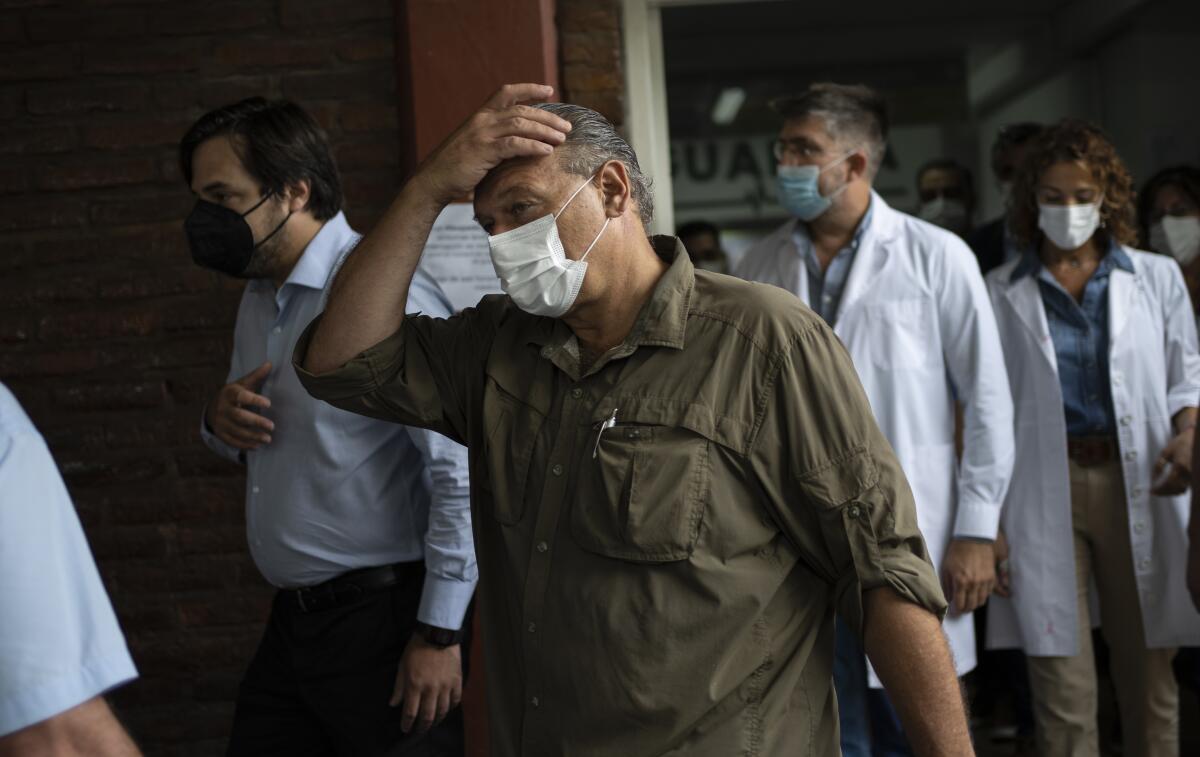Argentina reels as toxic batch of cocaine kills at least 20

- Share via
BUENOS AIRES, Argentina — A batch of cocaine that has killed at least 20 people in Argentina appears to have been laced with a synthetic opioid, and police are scrambling to get as much of it off the streets as they can.
Health authorities say at least 84 people have been hospitalized after using the contaminated cocaine, some of whom remain on life-saving respiratory support. The victims were mostly young Argentines from poor neighborhoods around the nation’s capital, Buenos Aires.
Police and public officials said that Argentina has never before suffered a drug-poisoning tragedy of this scale. Coverage of the deadly cocaine led national television broadcasts and was atop every newspaper.
Allan Santillán, 19, smoked the cocaine Tuesday night before going to sleep and his mother, a nurse, rushed him to a public hospital early the next morning.
“I woke up with my liver shot to hell, vomiting and with stomach pains,” Santillán told the Associated Press in an interview at the hospital. His mother, Natalia Santillán, said she was relieved her son had survived, but lamented others′ deaths.
“A lot of dead kids, it’s all so sad,” she said. “Something needs to be done, urgently.”
Police had confiscated 15,000 small bags of the contaminated drug as of Thursday and arrested seven people, Buenos Aires province’s federal crimes unit said in a statement.
Toxicology tests to determine which substance was mixed with the cocaine haven’t yet been completed. However, it appears to be a synthetic opioid used to intensify the effects of cocaine, according to Sergio Berni, security minister for the Buenos Aires province.
“Indirectly, we know it is an opioid, because the antidote is administered [to patients] and they react,” Berni told reporters in the capital.
One of the people arrested was Joaquín Aquino, known as “El Paisa,” who is the reputed leader of the drug ring that sold the cocaine, Berni told reporters. Authorities are investigating whether its toxic composition was accidental or perhaps an attempt to settle a feud between rival gangs.
Aldo Saracco, president of Argentina’s toxicology association, told local television station Todo Noticias that — unlike in Europe and the U.S. — poisoning from synthetic opioids hadn’t previously been witnessed in Argentina.
The number of deaths from drug poisoning involving cocaine in the U.S. has more than tripled, from roughly 4,500 per year a decade ago, according to the 2020 national drug threat assessment report from the Drug Enforcement Agency.
Some Argentine lawmakers and television pundits made statements Thursday questioning whether, in light of the incident, Argentina should consider legalizing some drugs.
The Center for Legal and Social Studies, a nongovernmental research organization that advocates for legalization, said a change in approach toward personal consumption would enable greater oversight and inspection.
“Although prohibition is the rule almost everywhere in the world, alternative models that emerged several years ago address consumption from a rights perspective, leaving aside the criminal system,” the group said in a statement.
The deaths and hospitalizations also shed light on the vulnerability of the nation’s poor, said Berni, the security minister.
“We Argentines cannot let this situation pass us by without starting to understand, on one hand, the phenomenon of narco-trafficking and, on the other, addiction,” he said. “Often they go unnoticed, often they hide beneath the rug. They must be made visible in order to deal with them in a more efficient way.”
More to Read
Sign up for Essential California
The most important California stories and recommendations in your inbox every morning.
You may occasionally receive promotional content from the Los Angeles Times.













